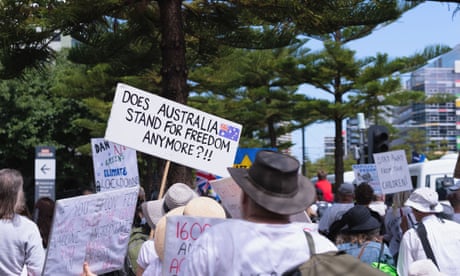- by foxnews
- 08 Apr 2025
‘Foreign actors’ may have fanned rightwing extremism during Covid to sway election, Liberal MP says
‘Foreign actors’ may have fanned rightwing extremism during Covid to sway election, Liberal MP says
- by theguardian
- 16 Dec 2022
- in news

The deputy chair of parliament's intelligence committee has suggested "foreign state actors" may have stoked anti-vaxxer and rightwing extremism sentiment in Australia during the Covid-19 pandemic in a bid to influence the outcome of the May federal election.
"I'm very mindful of the increase in the fanning of rightwing extremism in the lead-up to the last federal election," the Coalition MP Andrew Wallace told Guardian Australia.
"I don't have any evidence to support foreign actors [were] involved in that, but I'm concerned that is something that could have happened, as we know beyond a shadow of doubt there's been involvement of foreign actors in other countries' election processes."
It comes as the home affairs minister, Clare O'Neil, says the Wieambilla shooting in Queensland will raise "important policy questions" for government and security agencies, voicing concern around the role of extremism and conspiracy theories in the killing of two police officers and a member of the public.
Wallace is the deputy chair of the parliamentary Joint Committee on Intelligence and Security (PJCIS), and the member for the Queensland seat of Fisher.
He was also Speaker of the House in the final stages of the former Coalition government, where he received security briefings about anti-government protesters - a combination of far-right, anti-vaccination and anti-lockdown elements - who picketed parliament house in great numbers earlier this year.
It is expected the PJCIS will in the new year re-establish an inquiry into extremist movements and radicalism in Australia, which was not finalised in the last parliament.
Wallace noted repeated statements from Asio director Mike Burgess about rising rightwing or ideologically motivated extremism.
He also noted reports about conspiracy theories espoused by Gareth Train, one of the Wieamballa shooters, saying if those reports proved correct it could be an example of violence "arising out of anti-government sentiment".
Wallace said several federal MPs required personal security for the first time in the lead-up to the election, attributing it to "hard rightwing anti-government sentiment".
Speaking more broadly about rightwing extremism, Wallace raised concerns over whether Australian Covid-related protests may have been influenced by foreign actors. He stressed he had no evidence to support his concern, but said the PJCIS should be "mindful" of the possibility.
"There's very clear evidence of countries like Russia, in their use of bots to drive social media comments, that are damaging to democracy. It's not a big step to suggest there may have been further involvement," Wallace said.
"I'm not suggesting for a second that all people involved in rightwing extremism are doing the bidding of the Russians or Chinese, but I am suggesting it is possible that the rightwing extremism we experienced in the latter stages of Covid pandemic and lead-up to election could have been exacerbated by foreign state actors."
Labor MP Peter Khalil, chair of the PJCIS, said the government wanted to focus on prevention, not just response, pointing to the new cybersecurity strategy and also flagging reform of counter-terror laws to better capture rising rightwing extremism.
"We need a society-wide approach to countering extremism which addresses the factors of radicalisation at the source," he told Guardian Australia.
"Increasing polarisation, online-echo chambers and the intersection of ideological, transnational and socioeconomic factors have cultivated a febrile atmosphere for radicalisation that is challenging for security agencies and law enforcement.
"The pipeline towards extremism needs disrupting at its source, not just at the pointy end of the spear where violent attacks are imminent."
Julian Hill, another Labor MP on the PJCIS, expected the committee would be briefed and consider any lessons from the Queensland shooting once law enforcement had further investigated.
The Greens leader Adam Bandt, pointing to Covid-related anti-mandate protests in his home state of Victoria, told parliament on Thursday of his concerns about "a growing trend of extremism".
"In coming to grips with this shocking event and the horrific loss of life, our thoughts are with the victims' families and communities, and I hope it serves as wake-up call to those who would sow the seeds of conspiracy and division," he said about the Queensland shooting.
She said social media had "turbocharged" extremism and conspiracy theories, and national security agencies were "actively considering the implications" of the shooting, including misinformation and radicalisation.
O'Neil said earlier this month the government was reviewing terrorism laws to better capture the kind of activity conducted by rightwing extremists.
She and Dreyfus on Thursday declined to detail what those changes could include, but it's understood two new home affairs taskforces on national resilience and "strengthening democracy" will be involved in any response.
Wallace said he wasn't aware of any "obvious gaps" in Australia's terror laws, but speaking as chair of the PJCIS and not on behalf of the Coalition he added that he would support any reforms recommended by security agencies to address foreign or domestic forms of terror.
- by foxnews
- descember 09, 2016
Ancient settlement reveals remains of 1,800-year-old dog, baffling experts: 'Preserved quite well'
Archaeologists have recently unearthed the remarkably well-preserved remains of a dog from ancient Rome, shedding light on the widespread practice of ritual sacrifice in antiquity.
read more


